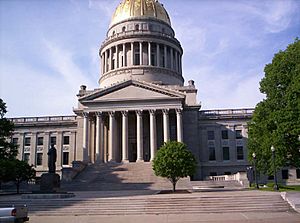Government of West Virginia facts for kids

|
|
| Polity type | Presidential republic Federated state |
|---|---|
| Constitution | Constitution of West Virginia |
| Legislative branch | |
| Name | West Virginia Legislature |
| Type | Bicameral |
| Meeting place | West Virginia State Capitol |
| Upper house | |
| Name | Senate |
| Presiding officer | Randy Smith, President |
| Lower house | |
| Name | House of Delegates |
| Presiding officer | Roger Hanshaw, Speaker |
| Executive branch | |
| Head of State and Government | |
| Title | Governor |
| Currently | Patrick Morrisey |
| Appointer | Election |
| Cabinet | |
| Name | Cabinet |
| Leader | Governor |
| Headquarters | West Virginia State Capitol |
| Judicial branch | |
| Name | Judiciary of West Virginia |
| Courts | Courts of West Virginia |
| Supreme Court of Appeals of West Virginia | |
| Chief judge | William Wooton |
| Seat | West Virginia State Capitol, Charleston |
The Government of West Virginia works a lot like the Government of the United States. It has three main parts, called branches. These branches make sure that power is shared and balanced.
The three branches are:
- The executive branch: This includes the Governor of West Virginia and other elected officials.
- The legislative branch: This is the West Virginia Legislature, which has two parts: the Senate and the House of Delegates.
- The judicial branch: This includes the West Virginia Supreme Court of Appeals and other courts.
The capital city of West Virginia is Charleston. This is where the main government offices are located.
Contents
Legislative Branch: Making Laws
West Virginia has a bicameral state legislature. This means it has two separate parts, or "houses," that work together to make laws. Almost all U.S. states have this kind of legislature.
The Two Houses
The two parts of the West Virginia Legislature are:
- The West Virginia House of Delegates: This is the "lower house."
- The Senate: This is the "upper house."
West Virginia's Legislature is often called a "citizen's legislature." This means that most lawmakers do not work there full-time. They often have other jobs in their home communities.
Legislative Sessions
The West Virginia Constitution says that regular lawmaking sessions can last up to 60 days. These sessions usually start on the second Wednesday of January each year.
Sometimes, the governor might call for a special session. This happens when important issues need quick action from the lawmakers.
Members of the Legislature
The House of Delegates has 100 members. Each member is called a delegate. They are elected for two-year terms. All delegates are up for election in even-numbered years. Each delegate represents about 17,000 people.
The Senate has 34 members. They are elected for four-year terms. There are 17 districts, and each district elects two senators. One senator from each district is elected during presidential election years, and the other is elected in the years in between. Each senator represents about 105,000 people.
Executive Branch: Carrying Out Laws
The chief executive of West Virginia is the governor of West Virginia. The governor is elected for a four-year term. This election happens at the same time as presidential elections.
The Governor's Role
A governor can serve two terms in a row. After that, they must wait for another election before they can run for governor again. Patrick Morrisey became governor on January 13, 2025.
Other Elected Officials
Besides the governor, there are five other important executive offices that people vote for directly:
- Secretary of State: Currently Kris Warner.
- Attorney General: Currently John McCuskey.
- Agriculture Commissioner: Currently Kent Leonhardt.
- Auditor: Currently Mark Hunt.
- Treasurer: Currently Larry Pack.
These officials are also elected every four years, at the same time as the governor. Unlike the governor, these offices do not have term limits.
Judicial Branch: Interpreting Laws
The judicial branch is made up of the state courts. They are responsible for interpreting the laws and making sure they are applied fairly.
State Courts
The main trial courts in West Virginia are the West Virginia Circuit Courts. There are 31 judicial circuits across the state, with a total of 70 Circuit Judges. These judges handle many different types of cases.
Family cases, like divorce or child custody, are handled by Family Courts. There are 27 Family Court Circuits with 45 judges.
Local judges are elected in non-partisan elections. This means they do not run as members of a political party. They serve for eight-year terms.
Smaller cases, like minor crimes or small claims, are heard by magistrates. Magistrates are elected for four years. They are not required to be lawyers.
Highest Courts
The West Virginia Supreme Court of Appeals is the highest court in the state. It hears appeals from lower courts.
There is also an Intermediate Court of Appeals of West Virginia. This court hears civil and administrative appeals. Criminal appeals go directly from the Circuit Court to the Supreme Court. The position of "Chief Justice" of the Supreme Court usually changes each year.
Local Government: Running Counties
In West Virginia, the county is the main unit of local government. West Virginia has 55 counties.
County Commissions
Each county has a county commission. This commission has three members who are elected for six-year terms. Their terms are set up so that one commissioner is up for reelection every two years. The county commission is in charge of making local laws and managing the county's money. They also handle some legal duties, like probate cases (dealing with wills and estates).
Other County Officials
Other important elected officials in each county include:
- The County Clerk: This person records deeds and registers voters.
- The Circuit Clerk: This person records actions from the Family and Circuit courts.
- The sheriff: This person is in charge of law enforcement and collecting taxes.
- The Prosecuting Attorney: This person must be a lawyer. They handle criminal cases and legal matters for the county.
- The Assessor: This person figures out the value of land for tax purposes.
Most of these officials are elected for four-year terms. The sheriff can only serve two terms in a row.
Boards of Education
Each county also has a Board of Education. This board has five members who are elected in non-partisan elections. They manage the public schools in the county.
See also
- List of governors of West Virginia
- United States congressional delegations from West Virginia
- Politics of West Virginia
- Political party strength in West Virginia


